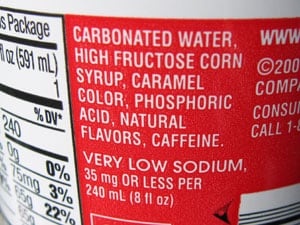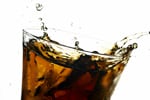In the latest complaint - (the third targeting Coke on this issue in three months) filed on October 28 in the Northern District of California by Ayanna Nobles and Julia Hughes vs Coca-Cola Refreshments USA Inc and the Coca-Cola Company (13-cv-5017), the plaintiffs say:
“Certain Coca-Cola containers … contain the affirmative statement that there are ‘no artificial flavors, no preservatives added’. This statement is false.”
Coca-Cola also “intentionally fails to disclose on… Coca-Cola containers that phosphoric acid is used in Coca-Cola as either an artificial flavoring and or as a chemical preservative”, state the plaintiffs, who are represented by attorneys Sydney J Hall in Burlingame, CA, and Reginald Terrell in Oakland, CA.
‘Defendants must disclose that an ingredient is being as an artificial flavoring or as a chemical preservative’
On its website, Coca-Cola states that phosphoric acid is used to “add tartness” to Coke and note that it is also an acidulant, which can “reduce the growth of micro-organisms”, claim the plaintiffs.
As it is being used to impart flavor to Coca-Cola - but is not derived from a spice, fruit, vegetable, edible yeast, herb, bark, bud, root, leaf, meat, fish, poultry, eggs, dairy products or fermentation products - argue the plaintiffs, phosphoric acid is classified by law an artificial flavor/flavoring.
And as it is also being used to prevent spoilage, it is also technically classified as a ‘chemical preservative’ as it is not a common salt, sugar, vinegar, spice or oil extracted from spices, nor a substance added to food via exposure to wood smoke or chemicals applied for insecticidal or herbicidal properties.
Therefore, it should be labeling accordingly, allege the plaintiffs.
“Under the [federal] Food Drug & Cosmetic Act and [California’s] Sherman Law, defendants must disclose that a product ingredient is being as an artificial flavoring and or as a chemical preservative...

The complaint comes hot on the heels of near-identical lawsuits filed by Paul Merritt vs BCI Coca-Cola Bottling Co. of Los Angeles and Coca-Cola Bottling Company of Sonora, CA, in mid-October; and by George Engurasoff and Joshua Ogden vs Coca-Cola in late August (13-cv-03990).
Rebecca Cross: Expect more copycat suits
Coca-Cola has yet to file motions to dismiss any of these cases, so it’s not clear what arguments it will make against the complaints.
However, "more copycat suits will follow", predicted Rebecca Cross, an attorney at law firm BraunHagey & Borden LLP, told FoodNavigator-USA.
But she doubted they would make much headway: “I don’t think plaintiffs' allegations should survive a motion to dismiss.
“The plaintiffs are essentially arguing that consumers buy Coke because it is ‘natural’ and that they would not have bought the product if they knew it contained phosphoric acid. But I think we all know that’s not why people buy Coke.
“Moreover, I don’t think the representations plaintiffs takes issue with are even on most Coke labels, and phosphoric acid is clearly disclosed in the product’s ingredient list.”
Kristen Polovoy: The beverage industry has been a target of class actions even before the current consumer fraud food labeling phenomenon began its steady uptick about three years ago

However, Kristen Polovoy, counsel in the litigation department of Montgomery, McCracken, Walker & Rhoads LLP, told us that "as a consumer fraud class action against a beverage manufacturer, the Nobles case is probably better characterized as an ongoing trend that has had sustained momentum for quite some time.
"The beverage industry has been a target of class actions even before the current consumer fraud food labeling phenomenon began its steady uptick about three years ago. For example, consumers challenged soft drink ingredients like benzene, based on claims of alleged unhealthiness. More recently, beverage manufacturers have been sued for allegedly unhealthy levels of caffeine in energy drinks."
Beyond this product liability genre of claims, the industry has also been targeted in scores of lawsuits over the use of terms such as 'pure' (on products allegedly heavily processed, pasteurized, flavored, or manipulated to extend shelf life); 'all-natural' (on products containing the preservative sodium benzoate), or 'plus' (on products with added vitamins and minerals), she said.
"Unless and until the FDA defines 'natural' or the industry self-regulates by proposing a definition to regulators, any of these 'natural' cases arising from challenges to specific ingredients have several defense routes available beyond the standard class action defenses (Federal Rule 23, such as predominance of individualized issues).
"For example, 'all natural' foods such as grapes contain chemicals (e.g., methyl anthranylate). Can plaintiffs posit a principled basis upon which to argue that soda’s phosphoric acid (which contains phosphorous, a basic element) is any more 'unnatural' than methyl anthranylate? Without a master ingredient list in federal regulations of what is and is not natural, it’s still anybody’s game."
Coca-Cola declined to comment on the case at this time.
